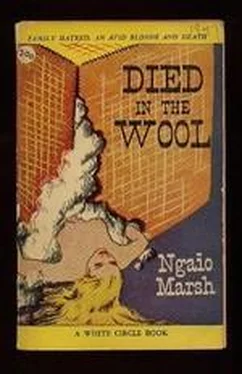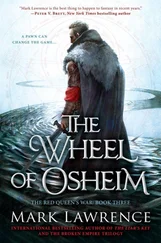Ngaio Marsh - Died in the Wool
Здесь есть возможность читать онлайн «Ngaio Marsh - Died in the Wool» — ознакомительный отрывок электронной книги совершенно бесплатно, а после прочтения отрывка купить полную версию. В некоторых случаях можно слушать аудио, скачать через торрент в формате fb2 и присутствует краткое содержание. Жанр: Классический детектив, на английском языке. Описание произведения, (предисловие) а так же отзывы посетителей доступны на портале библиотеки ЛибКат.
- Название:Died in the Wool
- Автор:
- Жанр:
- Год:неизвестен
- ISBN:нет данных
- Рейтинг книги:4 / 5. Голосов: 1
-
Избранное:Добавить в избранное
- Отзывы:
-
Ваша оценка:
- 80
- 1
- 2
- 3
- 4
- 5
Died in the Wool: краткое содержание, описание и аннотация
Предлагаем к чтению аннотацию, описание, краткое содержание или предисловие (зависит от того, что написал сам автор книги «Died in the Wool»). Если вы не нашли необходимую информацию о книге — напишите в комментариях, мы постараемся отыскать её.
Died in the Wool — читать онлайн ознакомительный отрывок
Ниже представлен текст книги, разбитый по страницам. Система сохранения места последней прочитанной страницы, позволяет с удобством читать онлайн бесплатно книгу «Died in the Wool», без необходимости каждый раз заново искать на чём Вы остановились. Поставьте закладку, и сможете в любой момент перейти на страницу, на которой закончили чтение.
Интервал:
Закладка:
“And the boy himself?”
“He’s all right, really. He’s a likely lad, and he thinks for himself, too. We’re good friends, young Cliff and I. I lend him the New Statesman and he rebuilds the government, social customs and moral standards of mankind on a strictly non-economic basis two or three times a week. His music is really good, I believe, though I’m afraid it’s not getting much of a run these days. I’ve tried to induce him to practise on the Bechstein over here but he’s an obstinate young dog and won’t.”
“Why?”
“It was Flossie’s.”
“So the quarrel went deep?”
“Yes. It’s lucky for young Cliff that he spent the crucial time screwing Bach out of that haggard old mass of wreckage in the annex. Everybody knew about the row and his bolt down-country afterwards. Your boy-friend, the Sub-Inspector, fastened on it like a limpet but fortunately we could all swear to the continuous piano playing. Cliff’s all right.”
“What’s the explanation of the whisky incident?”
“I’ve not the slightest idea but I’m perfectly certain he wasn’t pinching it. I’ve tried to get the story out of him but he won’t come clean, blast him.”
“Does he get on well with the other men?”
“Not too badly. They were inclined at one time to look upon him as a freak. His schooling and tastes aroused their deepest suspicions, of course. In this country, young men are judged almost entirely on their ability to play games and do manual labour. However, Cliff set about his holiday jobs on the station with such energy that they overlooked his other unfortunate interests and even grew to encourage him in playing the piano in the evening. When he came home a good whole-hog Leftist, they were delighted, of course. They’re a good lot — most of them.”
“Not all?”
“The shearers’ cook is not much use. He only comes at shearing time. Mrs. Johns looks after the regular hands at other times. Lots of the shearers wait until they’ve knocked up a good fat cheque and then go down-country and blue it all at the pub. That’s the usual routine and you won’t change it until you change the social condition of the shearer. But this expert keeps the stuff in his cookhouse and if we get through the shearing season without a bout of D.T.s we’re lucky. He’s a nasty affair is Cookie but he’s unavoidable. They don’t dislike him, oddly enough. The roustabout, Albie Black, is rather thick with him. He used to be quite mately with young Cliff, too, but they had a break of some sort. Fortunately, I consider. Albie’s a hopeless sort of specimen. Now, if it’d been Albie who pinched the whisky I shouldn’t have been the least surprised. Or Perce. The cook’s name is Percy Gould, commonly called Perce. All Christian names are abbreviated in this country.”
“How did Mrs. Rubrick get on with the men?”
“She thought she was a riotous success with them. She adopted a pose of easy jocularity that set my teeth on edge. They took it, with a private grin, I fancy. She imagined she had converted them to a sort of antipodean feudal system. She couldn’t have been more mistaken, of course. I heard the wool sorter, a perfectly splendid old boy, he is, giving a very spirited imitation of her one evening. I’m glad the men were fifteen miles away from the wool-shed that night. The Sub-Inspector is a very class-conscious man. His suspicions would have gravitated naturally to the lower orders.”
“Nonsense,” said Alleyn cheerfully.
“It’s not. He brightened up no end when Douglas started off on his Markins legend. Markins, being a servant, might so much more easily be a murderer than any of us gentry. God, it makes you sick!”
“Tell me,” said Alleyn, “have you any suspicions?”
“None! I think it’s odds on a swagger had strayed up to the wool-shed and decided to doss down for the night. Flossie may have surprised him and had a row with him. In the heat of the argument he may have lost his temper and gone for her. Then when he found what he’d done, he put on Tommy Johns’s overalls, disposed of his mistake in the first place that suggested itself to him, and made off down-country. She hated swaggers. Most stations gave them their tucker and a doss-down for the night in exchange for a job of work, but not Flossie. That’s my idea. It’s the only explanation that seems reasonable. The only type that fits.”
“One of the lower orders in fact?”
“Yes,” said Fabian after a pause. “You got me there, didn’t you?”
“It was a cheap score, I’m afraid. Your theory is reasonable enough but no wandering tramp was seen about the district that day. I understand they stick to the road and usually make themselves known at the homesteads.”
“Not at Mount Moon with Flossie at home.”
“Perhaps not. Still your swagger remains a figure that as far as the police investigations go, and they seem to have been painstaking and thorough, was seen by nobody, either before or after the night of the disappearance.”
“I’ve no other contribution to offer, I’m afraid, and I’m keeping you up. Good night, sir. I’m still glad you came.”
“I hope you’ll continue of that mind,” said Alleyn. “Before you go, would you tell me how many of you played tennis on the night Mrs. Rubrick disappeared?”
“Now, this,” said Fabian with an air of gratification, “is the real stuff. Why should you want to know that, I wonder? Only Douglas and I played tennis.”
“You wore rubber-soled shoes during the search, then?”
“Certainly.”
“And the others? Can you remember?”
“Pin heels. They always did in the evenings.”
“When, actually, did Mrs. Rubrick first say she was going to the wool-shed?”
“Soon after we sat down. Might have been before. She was all arch about it. ‘What do you suppose your funny old Floosie’s going to do presently?’ That kind of thing. Then she developed her theme; the party and what-not.”
“I see. Thank you, very much. Good night.”
Fabian had gone and Alleyn was alone in the silent room. He stood motionless, a tall thin shape, dark in the candlelight. Presently he moved to the desk and opened one of the locked cases. From this he took a small tuft of cotton wool and dropped it on the carpet. Even by candlelight it was conspicuous, unavoidable, a white accent on a dark green ground. So must the tuft of wool have looked when Ursula, on the morning after Florence disappeared, caught it up in the carpet sweeper. Yet she hadn’t noticed it. Or had she merely forgotten it? They were all agreed that Flossie would never have suffered it to lie there. She had been up to her room after dinner and before the walk through the garden. Presumably, there had been no wool on her carpet then. Alleyn heard again Ursula Harme’s voice: “I don’t care what anybody says. Somebody was about on the landing at five minutes to three that morning.”
Alleyn pulled out his pipe, sat down at the desk, and unlocked his dispatch case. Here were the police files. With a sigh he opened them out on the desk. The room grew hazy with tobacco smoke, the pages turned at intervals and the grandfather clock on the landing told twelve, half-past twelve and one o’clock.
…on February 19th, 1942, at 2.45 p.m. I received instructions to proceed to the wool store of Riven Brothers at 68 Jernighan Avenue. I arrived there in company with P.C. Wetherbridge at 2.50 p.m. and was met by the storeman, Alfred Clark, and by Mr. Samuel Joseph, buyer for Riven Brothers. I was shown a certain wool pack and noted a strong odour resembling decomposition. I was shown a bale hook which was stained brownish-red. I noted that twisted about the hook there was a hank of hair, reddish-gold in colour. I noted that the pack in question had been partly slit. I instructed P.C. Wetherbridge to extend the slit and open up the pack. This was done in my presence and that of Alfred Clark. Samuel Joseph was not present, having taken sick for the time being, and retired to the outer premises. In the pack we located a body in an advanced state of decomposition. It was secured, in a sitting position, with the legs doubled up and fastened to the trunk with nineteen turns of cord subsequently identified as binder twine. The arms were doubled up and secured to the body by twenty-five turns of twine used for wool bales passing round the arms and legs. The chin rested on the knees. The body rested upon a layer of fleece, hard packed and six inches in depth. The body was packed round with wool. Above the body the bale was packed hard with fleece up to the top. The bale measured 28 inches in width both ways, and four feet in height. The body was that of a woman of very slight build. I judged it to be about five feet three inches in height. I left it as it was and proceeded to…
Читать дальшеИнтервал:
Закладка:
Похожие книги на «Died in the Wool»
Представляем Вашему вниманию похожие книги на «Died in the Wool» списком для выбора. Мы отобрали схожую по названию и смыслу литературу в надежде предоставить читателям больше вариантов отыскать новые, интересные, ещё непрочитанные произведения.
Обсуждение, отзывы о книге «Died in the Wool» и просто собственные мнения читателей. Оставьте ваши комментарии, напишите, что Вы думаете о произведении, его смысле или главных героях. Укажите что конкретно понравилось, а что нет, и почему Вы так считаете.










